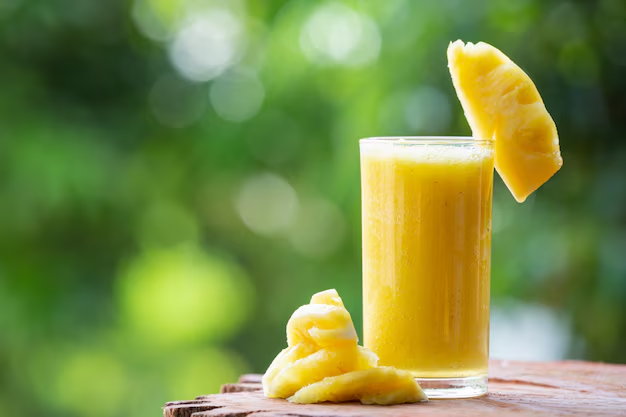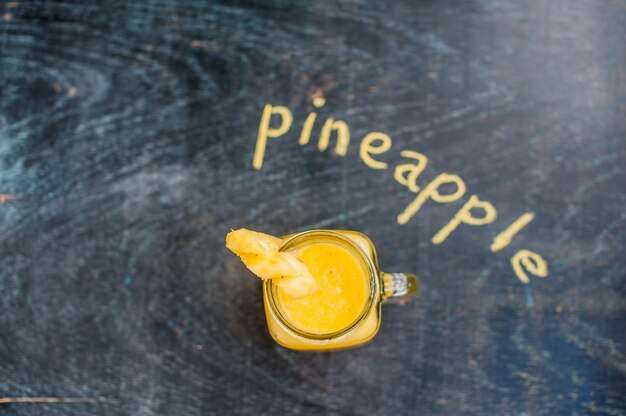Pineapple juice is often praised for its potential health benefits. Among these, its role in reducing swelling and inflammation has gained attention. Swelling, whether caused by injury, surgery, or chronic conditions, can be managed through dietary choices.
Pineapple juice contains bromelain, a natural enzyme known for its anti-inflammatory properties. This article will tell you about does pineapple juice help with swelling? and the science behind bromelain, and the evidence supporting its use.
Does Pineapple Juice Help with Swelling?
Yes, pineapple juice can help reduce swelling in some cases. Its effectiveness lies in bromelain, a powerful enzyme found in the fruit. Bromelain targets inflammation, which is a key driver of swelling. Whether swelling occurs due to injury, surgery, or inflammation-related conditions, pineapple juice may provide relief.
However, it’s not a miracle cure. The effect depends on the cause of the swelling and the amount of bromelain consumed. Pineapple juice works best as a part of a balanced diet. It’s most effective when combined with other anti-inflammatory measures, like proper hydration and rest.
Regularly drinking pineapple juice may offer mild anti-inflammatory effects. Yet, fresh juice or supplements containing concentrated bromelain are often more potent. Always consult a doctor before using pineapple juice for medical purposes, especially if you have underlying health conditions.
Why Is Pineapple Juice Believed to Reduce Swelling?
Pineapple juice’s reputation as a swelling remedy stems from its bromelain content. Bromelain is a natural anti-inflammatory compound found in the stem and juice of pineapples. It’s been used for centuries in traditional medicine to treat wounds and reduce inflammation.
Historically, indigenous populations in Central and South America used pineapple for its healing properties. The fruit was applied to bruises, cuts, and other injuries. Over time, modern research confirmed that bromelain targets inflammation and helps manage swelling. Its natural origin and minimal side effects make it appealing as an alternative remedy.
In addition to bromelain, pineapple juice contains vitamin C and antioxidants. These nutrients support tissue repair and reduce oxidative stress, further promoting healing.
How Does Bromelain in Pineapple Juice Work?
Bromelain is a proteolytic enzyme, meaning it breaks down proteins. This ability helps bromelain reduce swelling in two main ways.

Targeting Inflammatory Pathways
Inflammation is the body’s response to injury or irritation. It’s controlled by certain molecules, such as prostaglandins and cytokines. Bromelain disrupts the production of these molecules. By doing so, it reduces the body’s inflammatory response, leading to less swelling.
Improving Circulation
Swelling often results from fluid buildup in tissues. Bromelain helps by breaking down fibrin, a protein involved in blood clotting. This improves blood flow and lymphatic drainage, which helps reduce swelling more quickly.
Reducing Pain and Discomfort
Bromelain has analgesic properties. It blocks pain signals from reaching the brain, providing relief from discomfort associated with swelling. These combined effects make bromelain a versatile anti-inflammatory agent.
Medical Conditions Where Pineapple Juice May Help with Swelling
Arthritis and Joint Pain
Swelling in the joints is a common symptom of arthritis. Bromelain may help by reducing the inflammation that causes pain and stiffness. Studies show that bromelain supplements can be as effective as non-steroidal anti-inflammatory drugs (NSAIDs) for mild arthritis.
Post-Surgical Swelling and Recovery
After surgery, inflammation is a natural part of healing. Bromelain can speed up the recovery process by reducing swelling and pain. Many doctors recommend it as a supplement to aid post-surgical healing.
Sports Injuries and Exercise-Induced Inflammation
Athletes often experience swelling from muscle strain or injury. Pineapple juice, rich in bromelain, may help reduce recovery time. It works by minimizing inflammation and improving blood flow to affected areas.
Digestive System Swelling or Discomfort
Swelling isn’t limited to joints and muscles. Bromelain also helps with digestive inflammation, such as bloating or irritable bowel syndrome (IBS). It improves protein digestion and reduces gut irritation, making it beneficial for gastrointestinal health.
Evidence and Studies on Pineapple Juice for Swelling
Research supports the benefits of bromelain in reducing swelling, though limitations exist.
Studies show that bromelain reduces inflammation in conditions like arthritis, sinusitis, and post-surgical recovery. For example, a study published in Alternative Medicine Review highlighted bromelain’s effectiveness in treating osteoarthritis symptoms.
Comparisons with Other Remedies
Bromelain has been compared to NSAIDs in clinical trials. While NSAIDs are stronger, bromelain offers a natural alternative with fewer side effects. Combining bromelain with other anti-inflammatory nutrients, like curcumin or omega-3s, enhances its effectiveness.
Limitations of Current Research
While promising, most studies on bromelain involve supplements, not pineapple juice. Juice contains less bromelain, making it less potent. Additionally, the enzyme may lose effectiveness during processing. More research is needed to determine the optimal dosage and efficacy of pineapple juice for swelling.
How to Use Pineapple Juice to Manage Swelling?
For managing swelling, drink 1 to 2 cups of fresh pineapple juice daily. Consuming it on an empty stomach may maximize bromelain absorption. However, moderation is key. Too much juice can cause digestive discomfort or spike blood sugar levels.
Fresh vs. Packaged Pineapple Juice: Nutritional Differences
Fresh pineapple juice is superior to packaged varieties. It retains more bromelain and essential nutrients like vitamin C. Packaged juices often contain added sugars and preservatives, reducing their health benefits. Additionally, heat pasteurization in packaged juice can deactivate bromelain, making fresh juice the better choice for swelling management.
Pairing Pineapple Juice with Other Anti-Inflammatory Foods
For enhanced benefits, pair pineapple juice with anti-inflammatory foods like:
- Ginger: Add a small piece of ginger to pineapple juice for a powerful anti-inflammatory combo.
- Turmeric: Mix a pinch of turmeric into your juice for added healing properties.
- Leafy Greens: Blend spinach or kale into a smoothie with pineapple juice for added antioxidants.
Incorporating these foods ensures you’re supporting your body’s natural healing processes comprehensively.
Potential Side Effects and Precautions

Possible Allergic Reactions to Bromelain
Some people may be allergic to bromelain. Symptoms include itching, rashes, or swelling of the mouth and throat. If you notice any allergic reactions, discontinue use and seek medical advice.
Interactions with Medications
Bromelain can interact with blood-thinning medications, like warfarin, and increase the risk of bleeding. It may also affect the absorption of antibiotics, such as amoxicillin. Always consult a healthcare provider before adding pineapple juice to your routine if you’re on medication.
Impact of High Sugar Content on Health
Pineapple juice is naturally high in sugar. Drinking too much can lead to blood sugar spikes, especially in people with diabetes. Opt for fresh juice with no added sugar and limit servings to one or two cups per day.
Other Precautions
- Avoid pineapple juice if you have acid reflux, as it may worsen symptoms.
- Pregnant women should consult a doctor before consuming large amounts due to bromelain’s effects on uterine contractions.
Related to Read: Is Pineapple a Citrus Fruit? Unveiling the Facts
Pineapple Juice Alternatives for Reducing Swelling
While pineapple juice is effective, other drinks also help reduce swelling:
- Turmeric Tea: Contains curcumin, a potent anti-inflammatory compound.
- Ginger Water: Reduces swelling and supports digestion.
- Green Tea: Rich in antioxidants that combat inflammation.
Pineapple Juice vs. Bromelain Supplements
Bromelain supplements provide a concentrated dose of the enzyme. They are ideal for individuals who want precise dosing or cannot tolerate the acidity of pineapple juice. However, supplements lack the vitamins and antioxidants found in juice. Juice is a natural, enjoyable option for mild inflammation, while supplements may be more effective for severe swelling.
Pros and Cons of Pineapple Juice vs. Alternatives
| Option | Pros | Cons |
| Pineapple Juice | Tasty, rich in nutrients, versatile | High in sugar, less bromelain |
| Bromelain Supplements | High concentration, precise dosing | Lacks vitamins, requires guidance |
| Other Anti-Inflammatory Drinks | Variety of flavors, additional benefits | May lack bromelain’s effects |
Tips for Incorporating Pineapple Juice Into Your Diet
Recipe Ideas
- Morning Smoothie: Blend fresh pineapple juice with spinach, banana, and a teaspoon of flaxseed for a nutritious start to your day.
- Tropical Mocktail: Mix pineapple juice with coconut water and a splash of lime for a refreshing drink.
- Zesty Marinade: Use pineapple juice as a base for marinades to tenderize chicken or fish while adding a sweet and tangy flavor.
Best Times to Consume Pineapple Juice
- Morning: Drinking it on an empty stomach may enhance bromelain absorption.
- Post-Exercise: Reduces exercise-induced inflammation and aids muscle recovery.
- With Meals: Combines well with other foods to boost anti-inflammatory effects.
When to Seek Medical Advice
Swelling is not always a simple issue. Sometimes, it indicates a serious underlying condition.
When Swelling May Be a Concern
- Swelling that persists for weeks despite treatment.
- Accompanied by severe pain, redness, or fever.
- Swelling due to unknown causes.
Consulting a Healthcare Provider
If you plan to use pineapple juice as a remedy, discuss it with your doctor, especially if you have existing health conditions or take medications. They can advise on safe usage and prevent potential side effects.
FAQs
Does pineapple juice reduce inflammation?
Yes, pineapple juice contains bromelain, a natural enzyme with proven anti-inflammatory properties. It may help alleviate swelling caused by injuries, surgeries, or conditions like arthritis. However, more research is needed for definitive conclusions.
How much pineapple juice should I drink for swelling?
To manage swelling, aim for one to two cups of fresh pineapple juice daily. Avoid overconsumption due to its high sugar content. Consult your doctor if you’re managing medical conditions or taking medications.
Is bromelain only found in pineapple juice?
No, bromelain is found in both pineapple juice and the fruit, especially in the stem. Bromelain supplements may also provide concentrated doses for therapeutic use.
Are there side effects of drinking pineapple juice for swelling?
While generally safe, pineapple juice may cause allergies or interact with medications like anticoagulants. It’s also high in natural sugars, which might affect blood sugar levels.
Conclusion
Pineapple juice, with its rich bromelain content, offers a natural way to manage swelling. From arthritis to post-surgical recovery, it has potential benefits for various conditions. However, it’s important to note its limitations. While helpful, it’s not a substitute for medical treatment. For best results, combine it with other anti-inflammatory strategies and consult a healthcare provider for guidance.


